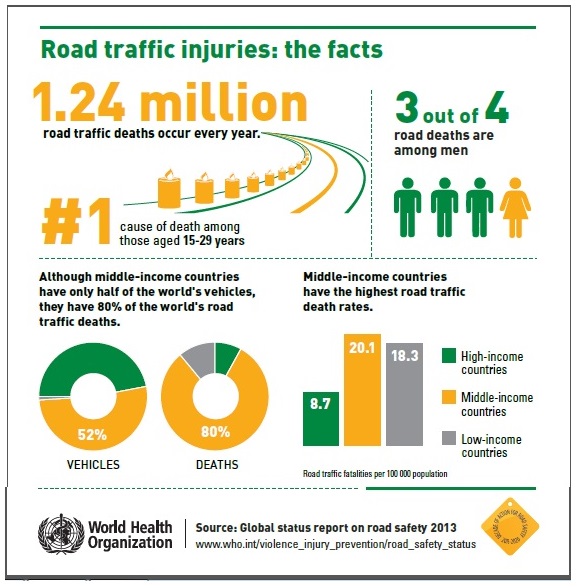A few days back a young man from Kurukshetra, Dikshant Sharma had started a petition requesting Aamir Khan to take up the issue of Road Accidents in India on his show Satyamev Jayate.
After I signed the petition [i], I surfed for information on road traffic accidents and came to know the following facts:
According to the World Health Organisation (WHO), road traffic accidents are the leading cause of death for young people in developing countries. India accounts for about 10% of road crash fatalities worldwide.
One person dies every five minutes on Indian roads. Going by National Crime Records Bureau (NCRB), this figure is expected to escalate to one death every three minutes by 2020 [ii]. In terms of absolute numbers more people die in road crashes in India than anywhere else in the world.
Every other day we read in the newspapers about road accidents. Unresponsive governance coupled with personal apathy makes the situation worse and many are left to die on the streets even when hospitals are close by.
The disconcerting question is why do these recurring incidents of traffic death remain as just statistics and do not stir up the authorities or people in general?
This problem of personal apathy & unresponsive governance can partly be explained by the fact that people tend to fear and react more to situations in which many people may be killed at one point in time as opposed to situations in which number of casualty remains the same or might be even more, but the deaths are distributed over a longer period of time.
These low-probability high-consequence events such as the terrorist attacks in Mumbai in 2008 or the disappearance of MH370 are known as 'Dread Risks'. Since dread risk events are perceived as unknown and potentially catastrophic, such events evoke widespread fear, anxiety and sharp psychological reactions that may produce large ripple effects.
An article published in Psychological Science, on behalf of the American Psychological Society corroborates the concept of Dread Risk. The study suggests that the fear of flying following September 11, 2001 caused more people in America to travel by road, resulting in 353 additional highway deaths than would have otherwise been the case [iii]. As the dread risk events have enormous impact simultaneously on a large group of people, these are highly publicized and governments all around the world, focus on responding to events quickly to control & contain the situation and rightly so.
On the other hand, in case of road accidents, though the families of victims suffer immense psychosocial distress, the psychological impact on general public is not so pronounced. Despite the appalling dimensions of the problem, road safety ranks very low on our list of priorities. The cultural indifference ambivalence towards road traffic deaths, does not compel the government to change the status quo. More people die in road crashes than due to malaria or TB, yet the government hardly notices.
This emphasizes the necessity for creating awareness about the need for pre-hospital emergency medical response for accident victims. We need a shift in focus from inevitability of the accidents to preventability of accidents and injury control.
This is not to say that public awareness initiatives will be sufficient to prevent the road tragedies; it will require the concerted effort from government including parliament, the police, road users, NGOs and the media to develop & implement policies on injury prevention. Scientifically designed roads, automobile design safety, better law enforcement and road user sensitization are needed to bring down RTAs.
However to begin with, if the public were better informed about the plight of accident victims, and how to provide them immediate access to medics, it will also possibly help in creating demand for emergency response for accident victims, thus saving thousands of lives.
References:
[ii] http://www.livemint.com/Opinion/D8iIIQDQkx8RGRdzros9tI/Taking-note-of-road-deaths-in-India.html
[iii] Dread Risk, September 11, and Fatal Traffic Accidents by Gerd Gigerenzer, Max Planck Institute for Human Development, Berlin, Germany

No comments:
Post a Comment